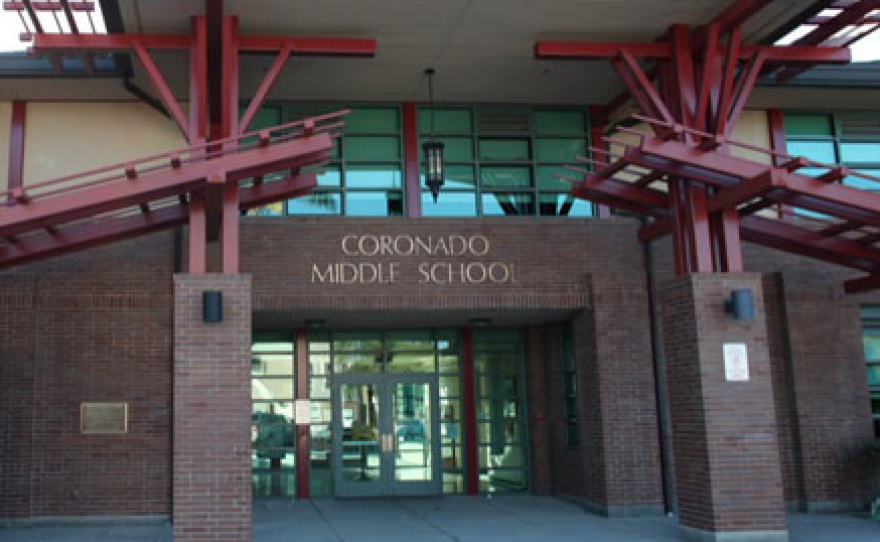About 230 people are calling on Coronado school district leaders to renounce any solidarity with the Black Lives Matter movement and halt any new anti-racist policies or curriculum, according to an online petition that has garnered support from several leaders of a local church.
“Please educate, not indoctrinate,” wrote David McElrath, reverend of Coronado’s Graham Memorial Presbyterian Church, July 23 on the petition – which calls for district leaders to reject changing curriculum for the new school year “designed to reeducate students through a racial justice lens.”
“No radical political indoctrination in our schools,” another supporter and Graham Memorial elder, Jay Chesnut, wrote online July 20.
“The Coronado school board works for the citizens of Coronado not the other way around,” Graham Memorial deacon Matthew Heidt commented on the online petition the same day. “The knee jerk reaction to BLM propaganda is wrong, and parents expect that the school will prepare our kids for higher education not for political action.”
Like other communities and schools, Coronado saw protests sparked by the Minneapolis police killing of George Floyd earlier this year turn into local calls to combat racism and improve the educational experience for students of color – some of whom came forward publicly to describe racist taunts and problems with Coronado’s annual Colonial Day celebration.
The initial protests led more than 4,500 people to sign a Change.org petition asking the Coronado school district to do things like “teach the history of minority groups from their perspectives,” “require English classes to read books written by African American and American minority authors,” “encourage students to learn about and acknowledge their own ignorance and biases” and “acknowledge the lack of racial diversity in Coronado and how it came to be.”
Another citizens group formed recently called InclusioNado sought similar reforms, as well as regular teacher training on bias and race, a specific ban on racial slurs with “consistent, strict consequences,” more diverse hirings, an increase in inter-district transfer students to the mostly White district and the hiring of a consultant to evaluate and recommend changes to address systemic racism, among other things.
But unlike many other communities, such race-minded reforms, a written statement by Coronado Superintendent Karl Mueller saying “Black Lives Matter” and other comments lending his support were met by a contingent of opposition.
In a video in June, Mueller thanked the original student petitioners, called the movement a “human rights issue” and signaled changes would be made.
“Racial justice is not a political issue. It’s an American issue. I believe strongly that the Black Lives Matter issue is one that our community has embraced. I am so proud of our students that I have seen throughout town demonstrating their voice, their agency and their commitment to a better tomorrow,” Mueller said. “I want Coronado Unified School District to be on the front lines of systemic change. There is no place in Coronado Unified School District for hate. If our students have been subjected, I apologize and we need to and we can get better and we are committed to the work.”
A counter-petition was created in late July that has received 230 signatures. It calls BLM “a highly political Marxist organization with views that are rightfully alarming to anyone who believes in family, the Constitution, and civil society.”
Counter petitioners are aggrieved by support and alliance with the Black Lives Matter movement, citing problems with the organization’s mission statement. Some have claimed the organization aims to needlessly guilt-trip White people and divide races. Opponents also object to changes to Coronado’s educational program without first seeking public comment and debate. Some told the school board in comment cards at last week’s board meeting there is no need for change because their students never witnessed racism in Coronado schools – even though students of color have come forward in recent months to share stories of their racist encounters.
“The children are under enough pressure. Just teach them … Not BLM brainwash!” read a comment card by Eileen Hannegan Panek to the school board Aug. 13.
The controversy has even spurred some to run for school board to halt racial reform efforts, including Heidt, the church deacon, though he told VOSD he ultimately chose not to run and did not finish the paperwork to qualify for the ballot.
“My consideration of running was largely based upon this issue,” Heidt wrote in an email. “My understanding is that there are a couple of qualified candidates that generally share my point of view so I’m content to vote for them rather than split the vote.”
Those other candidates – Kenneth Michael Canada and Stacy Keszai – have also attended and served at Graham Memorial. Both also signed the counter-petition. Neither responded to VOSD inquiries about their views or candidacy.
McElrath told Voice of San Diego the counter-petition is not being led by church staff, even though three staff members, three elders and two deacons, as well as several church leader spouses and other churchgoers were among the first to lend their support. The other two on staff to sign it, a bookkeeper and the children’s director, did not respond to VOSD’s inquiries.
“The inculcation of certain BLM values in the public school is essentially indoctrination into highly controversial and, in my opinion, destructive agendas,” McElrath wrote in an email. McElrath said the counter petition doesn’t aim to outright stop anti-racism efforts in the school district, but he believes “involving parents and the community, along with people who have worked for years at the intersection of education and race, is the more thoughtful and appropriate approach.”
The opposition to racial justice efforts in Coronado schools doesn’t sit well with parent Anne Edwardson, whose two Black daughters have attended since 2017.
“I feel like we’re the Santee of the coast,” Edwardson told VOSD. “We just want a safe place for our kids to go to school. We want our kids treated with dignity and respect … I feel like they are masking their hate for Black people under this guise of anti-BLM.”
Edwardson was part of a group of protesters seeking change outside the board meeting last week, who could be heard periodically in the board room chanting to a drumbeat, “Hey, hey. Ho, ho. Racism has got to go!” “Children of color matter here!” and “Ban racial slurs!”
She told VOSD her children encountered racist taunts as early as first grade and had sand put in their hair by a classmate. She said she shared her girls’ bullying experiences with teachers, the principal, school board members and the parent teacher association and was blown off for years.
In March, before school closures took effect, Edwardson was reading a book about school integration to her daughter’s elementary class when a student with a history of bullying her daughter said something along the lines of, “Some people think Black people should still be slaves.”
Edwardson wanted parents in class notified and for the school to address it more broadly, but that request was denied, she said.
She said she would love to see the annual Colonial Day celebration replaced with a diversity day that celebrates a variety of races and countries, and a consultant hired to assess the district. She also wants training for staff on bias and structural racism.
Many White parents in town have been “really clueless about the fact racism even exists,” Edwardson said. She’s heard parents say, “my kids don’t see color” but “that’s a point of view privileged White people can have.”
“Coronado students are at a disadvantage,” growing up in a White bubble, Edwardson said. “There’s all these groups in San Diego if you cross the bridge.”
Caught in the middle of the controversy are Coronado school leaders, who oversee a student population that was 59 percent White last school year, 21 percent Latino and just 1.4 percent Black, according to state data.
To assuage some community concerns, Coronado school board member Esther Valdes asked district officials at the Aug. 13 meeting to confirm the district was not adopting Black Lives Matter curriculum, even though such materials are made available through the National Education Association and California Teachers Association.
Coronado’s director of student support services, Niamh Foley, confirmed no such adoption was being made, but some changes are happening in the short and long term.
Coronado school officials are adding a more explicit ban on racial slurs to the district’s disciplinary action guide that bars “biased language specifically related to race, religion, sexual orientation, ability or other discriminatory language.”
“We heard our students were saying very loudly and clearly that they were hearing use of racist language and administration was not doing enough about it,” Foley said.
The school board also plans to hold an equity workshop – with help from the San Diego County Office of Education – to decide what belongs in a new equity policy, initially drafted by the California School Boards Association. The draft language is largely focused on closing the achievement gap between different racial groups, but also broadly steers the district toward the removal of institutional biases.
The district plans to survey students on racial issues to inform changes to come.
Longer term, a committee of various stakeholders will begin looking at the district’s hiring practices, the possible addition of new curriculum or changes to staff training, among other things. The committee will have a two-year timeline to provide recommendations. A decision about how to choose who gets a seat on the committee has not been made, but Mueller, the superintendent, said they plan to ask the County Office of Education, for suggestions.
“The racial makeup of the city of Coronado doesn’t reflect most other areas,” Foley said. “Our kids leave here, and we want to make sure they are prepared for the world.”
While hiring is not and cannot be based on race, Foley said there may be other ways to boost staff diversity.
“Should we maybe be attending job fairs somewhere else that would attract a more diverse population of people that would want to come work here?” Foley said.
She said the counter-petition and backlash to Mueller’s “Black Lives Matter” statement wasn’t shocking and “as a school district we need to listen to all voices.”
“In general, people want to ensure the high level of performance in our school is maintained and they want to make sure their voice is heard as well. … Our mission is to maintain their high level of academic excellence.”
But rather than see changes aimed at ensuring all children feel “safe, valued and respected” as a threat, she said, “the two can go hand in hand, and in my opinion, do.”







